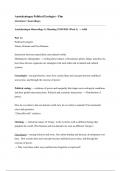Aantekeningen Political Ecologies - Pim
Literatuur / hoorcolleges
Aantekeningen Hoorcollege 1) Maandag 22/09/2024 (Week 1) → Aditi
Part 1):
Political Ecologies
Nature, Humans and Non Humans.
Interaction between materialistic and cultural worlds.
Multispecies ethnography → writing about culture, with animals, plants, fungo, microbes etc,
how these diverse organisms are entangled with each other and in natural and cultural
systems.
Genealogies - tracing histories, roots, how certain ideas and concepts become stabilized
across time, and through the exercise of power.
Political ecology → relations of power and inequality that shape socio ecological conditions
and their global interconnections. Political and economic dimensions. → Distribution of
justice.
How do we relate to the non-human world, how do we relate to animals? Environmental
crisis and questions.
“China Mieville” schrijver
Ontology → About the nature of ‘being’, in the world as well as different beings that
populate the world. (The humans and non-humans are seen as different ‘beings’).
Genealogies = tracing histories and roots. Also about kinship and descent, development over
time. How certain ideas and concepts become stabilized across time, and through the
exercise of power.
→ Why were these other ways and histories forgotten or repressed?
,The nature of something = the essence of something.
For example → Primitive, original, unspoiled, innocence.
Anthropocene…
Geological era, defined by the unprecedented effects of human activity.
What does it mean to be human in the Anthropocene?
Alexander von Humboldt (1769-1869)
- Rejected racist theories.
- The “Inventor of Nature”.
Cosmos (Universe as interrelated, an interactive entity)→ The earth is one living organism
where everything is connected (Soil, trees, rain, animals and humans).
The Nature/Culture Question:
Part 2): “The political in political ecology”
Lion King (Disney film)
Wilderness = no humans, empty of people. → The absence of humans.
But where is the maasai? → Tribe in Tanzania.
Humans destroy nature’s landscape etc…
Mass production → global markets
Interconnection of the global and the local.
Political ecology (Oikos = house)
- Viewing the systems as power laden rather than politically inert.
Political = onderzoeken wat zorgt voor deze crisissen.
Ecoscarcity = population growing at a rate that outstrips availability of natural resources and
the capacity of natural environment to sustain them.
,Neoliberalism = free market, globalist, capital and money can travel, space & time
compressions, the market supports the state.
Capitalism and climate change:
Part 3): “Ontologies” and anthropological perspectives on climate-change”
“I think therefore i am” → i think so i am real. You have to be if you think.
Ontology = Ontologie (filosofie) De ontologie (van het Grieks ὀν = zijnde en λόγος = woord, leer)
of zijnsleer is onderdeel van de metafysica, de filosofische tak die het wezen onderzoekt dat
achter de waargenomen werkelijkheid schuilgaat. → Bijvoorbeeld een inheemse of een
wetenschappelijke verklaring.
, Week 1):
Zaterdag 20/04/2024:
- Artikel: Williams, Raymond. 1985. “Ecology” (pp. 110-11) and “Nature” (pp.
219-224) from Keywords: A vocabulary of culture and society (Revised Edition).
New York: Oxford University Press.
ECOLOGY:
Ecology → a characteristic living place / ‘it lives’.
“And became the study of the relations of plants and animals with each other and with their
habitat.”
Ecology replaced the environment grouping and also extended these positions.
Samenvattend (NL):
Dit artikel behandelt de evolutie van het gebruik van de termen "ecologie" en "natuur" in de
Engelse taal. Hier zijn de belangrijkste punten:
Ecologie:
● Het gebruik van "ecologie" in het Engels dateert niet vaak voor de 20e eeuw,
hoewel de wetenschappelijke term (oorspronkelijk als "oecologie") teruggaat
tot de jaren 1870, voornamelijk via vertalingen van de Duitse zoöloog
Haeckel.
● "Ecologie" is afgeleid van het Griekse "oikos" wat "huishouden" betekent, en
"logos" wat "discours" of "systematische studie" betekent. Het ontwikkelde
zich tot een studie van de relaties tussen planten, dieren en hun habitat.
Natuur:
● "Natuur" is een van de meest complexe woorden in de Engelse taal en heeft
verschillende betekenissen, waaronder de essentiële kwaliteit van iets, de
inherente kracht die de wereld of mensheid beïnvloedt, en de materiële wereld
zelf.
● Het woord "natuur" komt van het Latijnse "natura" en heeft door de
geschiedenis heen verschillende betekenissen ontwikkeld, waaronder de
essentiële aard van iets en de fysieke wereld als geheel.




